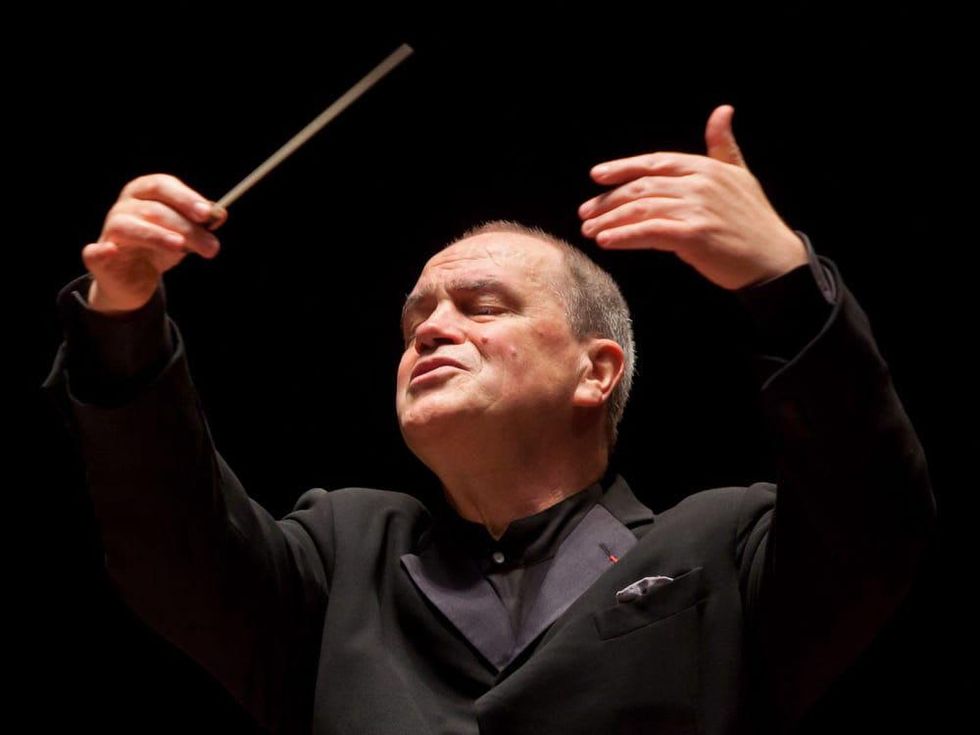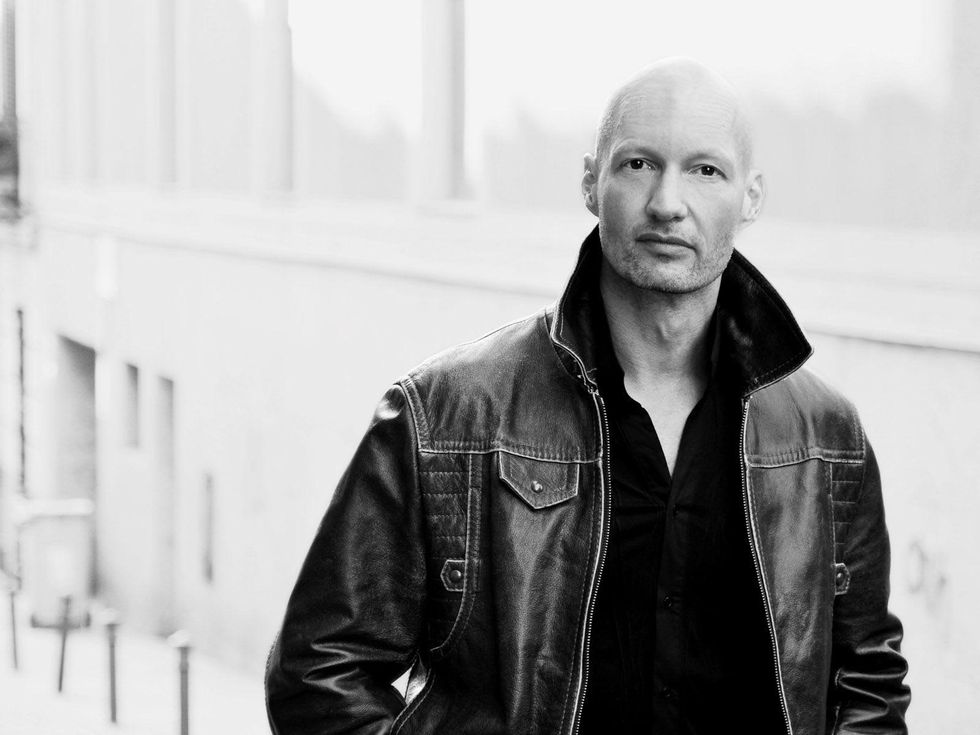Inside the music
Hans Graf's labor of love: Retiring Houston Symphony maestro dares to be bold with epic Wozzeck
Wozzeck. Gesundheit.
Such is the ongoing quip among young musicians who first encounter the mammoth score by Alban Berg, an opera that's forever imprinted in the history and theory curriculums at most music conservatories, joining the echelon of other Gesamtkunstwerk like Wagner's Tristan und Isolde and Stravinsky's Petrushka.
Although with time and study the music does get under your skin, the opera isn't love at first note for everyone. But it was for retiring Houston Symphony director Hans Graf when he was a teenager. Today he considers the Austrian composer his favorite tunesmith, and that's why, as part of his farewell to Houston audiences, he's chosen to present a concert version of Wozzeck on Friday and Saturday at Jones Hall.
"Berg is the greatest genius of musical construction, and one of the most deeply and genuinely emotional musicians," Graf tells CultureMap, sitting for a one-on-one interview in his dimly lit basement office in the orchestra's resident concert venue.
Surrounded by a collection of wine, recording and listening equipment, a neatly organized modern glass desk and posters of iconic music and theater productions — some of which his daughter, Anna, staged in Paris — this intimate space provides a respite where Graf gathers his thoughts on music, plans rehearsals and parses partitures.
Wozzeck rests atop a small pile of scores.
Graf's obsession with Berg began with the Piano Sonata, Op. 1 of 1910, a piece he describes as heartbreakingly beautiful, which he often performed as a young pianist. He's smitten with the Three Pieces for Orchestra, Op. 6 of 1913, the Chamber Concerto of 1925 and the Lyric Suite, written between 1925 and 1926 — the latter two belonging to the Second Viennese School's serial 12-tone approach as devised by Arnold Schoenberg.
"Berg is not just expressing a fantastic drama, a drama that takes me in, but it's a story that's really touching."
"Wozzeck is Berg's last work before he changed to Schoenberg's system," Graf explains. "Wozzeck's music is free. But freedom, in this case, is a very limited word because he sets rules for himself and stays in his framework.
"Berg is not just expressing a fantastic drama, a drama that takes me in, but it's a story that's really touching."
Alban Berg's Wozzeck is based on German playwright Georg Büchner's Woyzeck. The story follows a married couple, Wozzeck and Marie, through 15 banal scenes during which Wozzeck grows increasingly anxious of Marie's infidelity. He murders her by stabbing her in the neck. He drowns in a pool of water. Their young child is left alone, unconcerned with the loss of his parents.
It's a Disney happily-ever-after type of ending. Right.
Graf's Wozzeck
As they say, necessity is the mother of invention. For Graf, it marshaled a git-r-done attitude.
Graf was 32 years old in 1981 when he was called last minute to fill in and lead his first Wozzeck in Cagliari, Sardinia, Italy. With less than two weeks before the initial rehearsal prior to a four-performance run at the Teatro Palestrina with an ensemble that wasn't deemed the most clever, though with plenty of good will, Graf says, it was a sink or swim situation that was a turning point for the young conductor.
"When I went there, people in Austria told me I was crazy, that I would never be able to get through the piece," he recalls. "We did it quite well, actually. So what if the first performance didn't sell out?
"Word of mouth sold out the hall the second, third and final performances."
It was a proud moment for Graf, who believes the best way to master a score is to study it along with an orchestra. The ensemble's inability to sight read music well proved an advantage in his quest to grasp the ethos of the composition fully. Ten-hour rehearsal marathons were broken down in two-and-a-half-hour intervals during which he coached the woodwinds, upper strings, lower strings and brass separately. When the singers joined in, it was smooth sailing.
"After each round of rehearsals, we understood the music deeper and deeper," he says. "Soon enough we were all infected by the virus of Wozzeck. It doesn't leave you indifferent; it changes your concept of music and theater."
Wozzeck, the character, was a good man with a good woman, Marie. They are derailed by life to the extreme catastrophe of murder. Graf finds the music so immediately dramatic, down to how individual words in the text are complemented by music. Berg's structure fits theatrics like a glove to deliver what Graf considers the greatest and most beautiful challenge for the orchestra.
Graf compares Wozzeck to La traviata, whose protagonist is mistreated by a stupid, stubborn, narrow bourgeois. It's like La bohème, whose Mimi means well, but life isn't kind to her. Wozzeck isn't like Strauss' Der Rosenkavalier, whose long stretches in the first act can be cut without losing musical and narrative prowess. It isn't like Salome, whose Dance of the Seven Veils was criticized by Alma Mahler for sounding weak and jejune.
"The Houston Symphony should take care to not just do the allowed, non-metropolis repertoire. Should we do Wozzeck in New York, no one would ask why. Houston has the right to hear music like this."
"In Berg, there's nothing superficial, everything is gold, everything is of high intensity and of relentless challenging beauty," Graf says."You can't skip anything in Wozzeck. It's lean, there's not fat, but it's still juicy."
A farewell message
Otherwise a happy-go-lucky kind of man, Graf admits that programming Wozzeck may seem like he's a tad like Dr. Jekyll and Mr. Hyde. The work concludes with absolutely clueless, hopeless, vulnerable children unaware of the implications of the final scene, and the music ends in a style that can readily loop around to the beginning for yet another cycle, as if the next generation of protagonists are destined to make the same mistakes.
"The message should be positive, though it may sound negative," he says. "The Houston Symphony should take care not to just do the allowed, non-metropolis repertoire. Should we do Wozzeck in New York, no one would ask why. Houston has the right to hear music like this."
Placing the ensemble front and center is an homage to the symphony musicians, Graf says, as the execution of such a complex orchestra score is a feat of Olympic proportions.
"If I am going to be an advocate for one piece, it's Wozzeck, a child of love and labor."
As for the joke, Gesundheit, in German, means good health.
And that's what Graf wants for the future of the Houston Symphony, a befitting auf wiedersehen wish from the city's longest running maestro.
___
Houston Symphony presents Wozzeck in Concert on Friday and Saturday at Jones Hall. Tickets start at $25 and can be purchased online or by calling 713-224-7575.
Hans Graf conducts a cast that includes Roman Trekel as Wozzeck, Anne Schwanewilms as Marie, Gordon Gietz as Drum Major, Marc Molomot as Captain, Nathan Berg as Doctor, Robert McPherson as Andres, Katherine Ciesinski as Margaret, Calvin Griffin as Apprentice 1, Samuel Schultz as Apprentice 2, Brenton Ryan as Fool, voice students from the Shepherd School of Music at Rice University Adult Chorus directed by Grant Loehnig and members of the Houston Grand Opera Children's Chorus directed by Karen Reeves.




 The menu includes caviar, hot dogs, and taquitos.Photo by Julie Soefer
The menu includes caviar, hot dogs, and taquitos.Photo by Julie Soefer